
Masters of the Maze is a children's television game show that aired on the Family Channel from August 29, 1994, to September 15, 1995. After the last episode aired, the show went into reruns until September 22, 1996. The first season was hosted by J.D. Roth, and the second season was hosted by Mario Lopez.
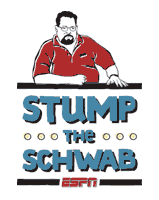
Stump the Schwab is an American game show that aired on ESPN2 and ESPN Classic from July 8, 2004 to September 29, 2006. The show featured three contestants trying to defeat Howie Schwab, ESPN's first statistician, in a sports trivia contest. Stuart Scott was the show's host. The show also appeared on Canada's The Score Television Network.
Going for Gold is a British television game show that originally aired on BBC1 between 12 October 1987 and 9 July 1996. It was revived for Channel 5 from 13 October 2008 to 20 March 2009.
Time Machine is an American game show where contestants compete to answer trivia questions about popular culture and recent history to win prizes. The show aired on NBC from January 7 through April 26, 1985, and was hosted by John Davidson. Charlie Tuna was the announcer, with Rich Jeffries as his substitute. Reg Grundy Productions produced the series, and upon its premiere Time Machine was one of three Grundy series airing on NBC.

Dream House is an American game show that saw contestants competing to win, as the title of the show indicates, a new house. The show originally premiered in primetime on ABC on March 27, 1968, with a daytime edition premiering on April 1, 1968. The primetime series aired weekly until September 19, 1968, and the daytime series aired daily until January 2, 1970, when it was replaced with All My Children. The daytime series was revived for NBC's daytime schedule and premiered on April 4, 1983, running until June 29, 1984.
Battle of the Brains is a quizbowl show in the Richmond and Hampton Roads areas of Virginia. It currently airs on WTVR in the Richmond area, and WTKR in Hampton Roads. The current show began in Richmond in 1975, and it originally aired on a local PBS member station until it was canceled by the station. Its 2002–2003 season was aired on a public-access television cable TV station, before the Richmond CBS affiliate added the show, where it currently airs on Saturday mornings at 10:00 A.M. The Hampton Roads program began with the 2004-2005 season, formerly airing on WAVY-TV. As of the 2017-18 season, it airs on WTKR at 11:00 A.M.
itbox is a networked gambling games terminal which is found in thousands of pubs, leisure centres and amusement arcades in the United Kingdom. Classified as a "skill with prize" (SWP) machine, each itbox terminal typically includes 25 different games. Each game costs 50p or £1 to play and lasts between 10 seconds and several minutes. From most of these games it is possible to win modest cash prizes. Although strictly the name 'itbox' refers only to Leisure Link-made terminals, the name is often casually applied as a genericized trademark to other SWP terminals such as Paragon SWP, Gamesnet, ind:e and Fatbox.
It's Academic is an Australian children's game show which is based on the long-running American version of It's Academic, and pits students from different schools against each other in a test of knowledge covering a number of diverse subjects including English, mathematics, science, geography, sport, music and popular culture.
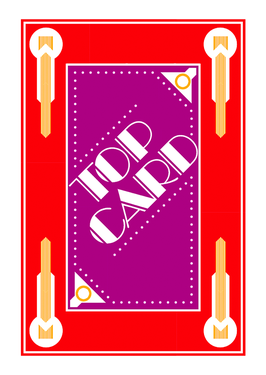
Top Card is a game show that aired on TNN and produced by Reid-Land Productions, replacing TNN's original game show Fandango. The show aired from April 3, 1989 to March 26, 1993 and was based on the card game Blackjack.
Raise the Roof was a British television game show which ran from 2 September 1995 to 13 January 1996 for ITV and was hosted by Bob Holness.
Skatoony is a children's live action/animated game show, pitting live-action kids against cartoons. The series was co-produced by Talent TV and FremantleMedia Animation, Blink Studios, and Marblemedia with Smiley Guy Studios. The series used to air on Cartoon Network in the UK until 2017, with new episodes airing every Friday until the series cancellation in 2008. Skatoony has also aired as re-runs in the UK on Boomerang and Cartoon Network Too until the channel itself closed down in 2014. The show aired on Starz Kids & Family in the US until 2019. Reruns were occasionally shown on Teletoon in Canada until August 5, 2017. It also aired on Boomerang in Australia and New Zealand.
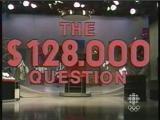
The $128,000 Question is an American game show which aired from 1976 to 1978 in weekly syndication. This revival of The $64,000 Question was produced by Cinelar Associates and distributed by Viacom Enterprises.
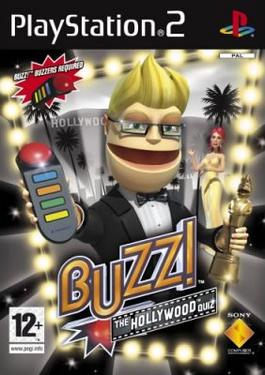
Buzz!: The Hollywood Quiz is the fifth installment in the Buzz! series of video games developed for the PlayStation 2 by Relentless Software. Players have to answer questions asked by the quiz master using the four Buzz! remote controls.
Turn It Up! is a musical game show that aired on MTV from June 30 to December 7, 1990. It was the second game show to be produced and broadcast on the network after Remote Control, produced by Albie Hecht, Alan Goodman, and Fred Seibert, of Chauncey Street Productions in New York City.
Rumor Has It is an American daily game show that aired on the cable channel VH1 from June 7 to October 28, 1993. Brian O'Connor was the host and John Ten Eyck announced.
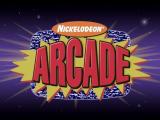
Nick Arcade is an American children's game show created by James Bethea and Karim Miteff and hosted by Phil Moore, with Andrea Lively announcing, that aired on Nickelodeon in 1992. It aired originally during weekend afternoons, with reruns airing until September 28, 1997. In the first season, the shows were taped in December 1991 and aired in early 1992. It was taped at Nickelodeon Studios at Universal Studios Florida in Orlando. In Nick Arcade, two teams of contestants played two initial trivia rounds, with the winning team advancing to the "Video Zone" to play against the virtual "Video Game Wizard" of the day.
On the Spot is an American game show produced by and broadcast on KGW-TV in Portland, Oregon as a daily series from September 1984 to October 1988. Newscaster Larry Blackmar was host, while local disc-jockey Michael Bailey announced.

Disney Think Fast is a Disney-themed trivia game show-based game developed by Magenta Software and published by Disney Interactive Studios. The game was released for the Wii in North America on October 21, 2008, and for Europe, Australia and Japan in December. The game was also released for PlayStation 2 in North America on November 7, November 14 in Europe, and in Australia on December 5.
Family Game Night is an American television game show based on Hasbro's family of board games and EA's video game franchise of the same name. The show was hosted by Todd Newton. Burton Richardson was the announcer for the first two seasons; he was replaced by Stacey J. Aswad in the third season, and Andrew Kishino was hired for the fourth season. The 60-minute program debuted on October 10, 2010, on The Hub ; it was previewed on October 9, 2010, on its sister channel, TLC. Seasons 1 and 2 contained 26 and 30 episodes respectively. Seasons 3, 4 and 5 each contained 15 episodes. Season 2 premiered on Friday, September 2, 2011, with additional games being added. The games added to the second season included Cranium Brain Breaks, Green Scream, Ratuki Go-Round, Simon Flash, Operation Sam Dunk, Trouble Pop Quiz, and Spelling Bee. However games from the previous season were still kept.
The Main Event was a weekly hour-long Australian game show that aired on the Seven Network from 1991 to 1992. The show was hosted by Larry Emdur, with Don Blake and Niel Chantler as announcers.







